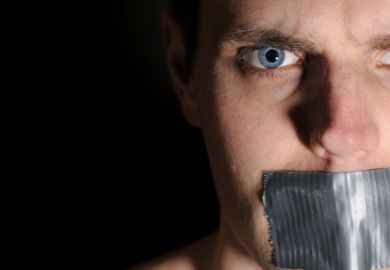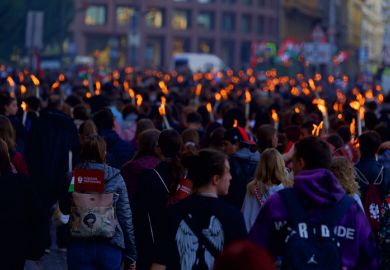Journalists with an article to write about the “new political correctness” that some believe is draining our campuses of free speech certainly have plenty of material to work with.
The Washington Post columnist George Will last week wrote an opinion piece castigating the “behavior-beyond-satire of what are generously called institutions of higher education”. His article simply lists ever more absurd examples of university policies (my favourite was the University of Wisconsin-Milwaukee’s claim that the term “politically correct” was itself a “microaggression”, perhaps anticipating criticisms in advance).
This is all very entertaining, of course, and the reader can alternately gasp and laugh at the sight of campus Left-liberalism disappearing down the rabbit hole. But such lists of the new political correctness’s greatest hits never quite get to the bottom of the key question: how pervasive is such a culture in our universities?
Read more: Today’s students are anything but coddled
I had assumed that the more wild examples – trigger warnings on The Great Gatsby, and so on – while attention-worthy, were rare. This was until I went for a drink with a friend who last academic year completed a master’s course in creative writing at a Russell Group university (he has asked to remain anonymous). His experience is only one more anecdote to add to the pile, true, but it does suggest how far certain aspects of this culture have moved into the classroom itself.
As part of the course, he and his classmates had to write and then read out poems on topics of their choosing. “From the start of the course, I had a number of discussions with students about the issue of whose voice I was and was not allowed to ‘appropriate’,” he recalled.
Things came to a head after he wrote a poem from the point of view of an Iraqi mourning the fragmentation of the country along sectarian lines after the invasion of 2003. This triggered a lengthy “telling off” from another (white, male) student, who raised his voice to the point where my friend felt threatened.
“The argument was that as a privileged white Western male, it was wrong of me to use the conflict in Iraq/Syria for my own creative purposes, and that in believing that I could, I was demonstrating a sense of entitlement,” my friend said.
“I argued back. No one else in the class disagreed with the student – even the tutor simply looked on in discomfort and did not engage with the question of appropriation (mainly I think because she was scared of the student, who is prominent).”
There were other similar incidents. “I wrote one piece in which I described a girl I knew called Danielle walking to a pound shop, and was told that by using the name ‘Danielle’ I was offensively stereotyping working-class people, even after I explained that she was a real person.”
After such “aggressive” feedback on his first term poems, he “became confined to writing pieces that were largely autobiographical, or, where political, were satires of consumerism or had some anti-capitalist or anti-imperialist theme”.
The objections to the student who told him off seem obvious. Writing a poem from another’s viewpoint isn’t even “appropriation” in the sense of wearing Native American dress for Halloween (leaving aside the ethics of that for now). It’s not as though my friend had come to class dressed as an Iraqi.
Such an attitude “makes it impossible for a writer to creatively put herself in another person’s shoes with the purpose of eliciting the reader’s sympathy for that person. We would not have had Dickens or Stephen Crane if we could not do this,” he told me.
His experience will trouble many. But it seems to me that there is one big caveat. The fuzzy phrase “new political correctness” encompasses all kinds of ideas and agendas on campus, including my friend’s telling off, “safe spaces”, the Black Lives Matter movement and arguably the current campaign to remove a statue of the imperialist Cecil Rhodes from a University of Oxford college.
But while some themes – notably identity and oppression – link these together, they surely deserve to be considered on their own merits. It might be naive to swallow the entire agenda whole. But it would be equally unthinking to dismiss with a snort every idea emanating from campus Left-liberals on the basis of a few laughable examples. As one of Times Higher Education’s features this week makes clear, there is definitely another side to the story.
Register to continue
Why register?
- Registration is free and only takes a moment
- Once registered, you can read 3 articles a month
- Sign up for our newsletter
Subscribe
Or subscribe for unlimited access to:
- Unlimited access to news, views, insights & reviews
- Digital editions
- Digital access to THE’s university and college rankings analysis
Already registered or a current subscriber? Login





